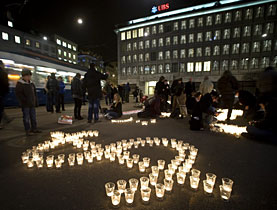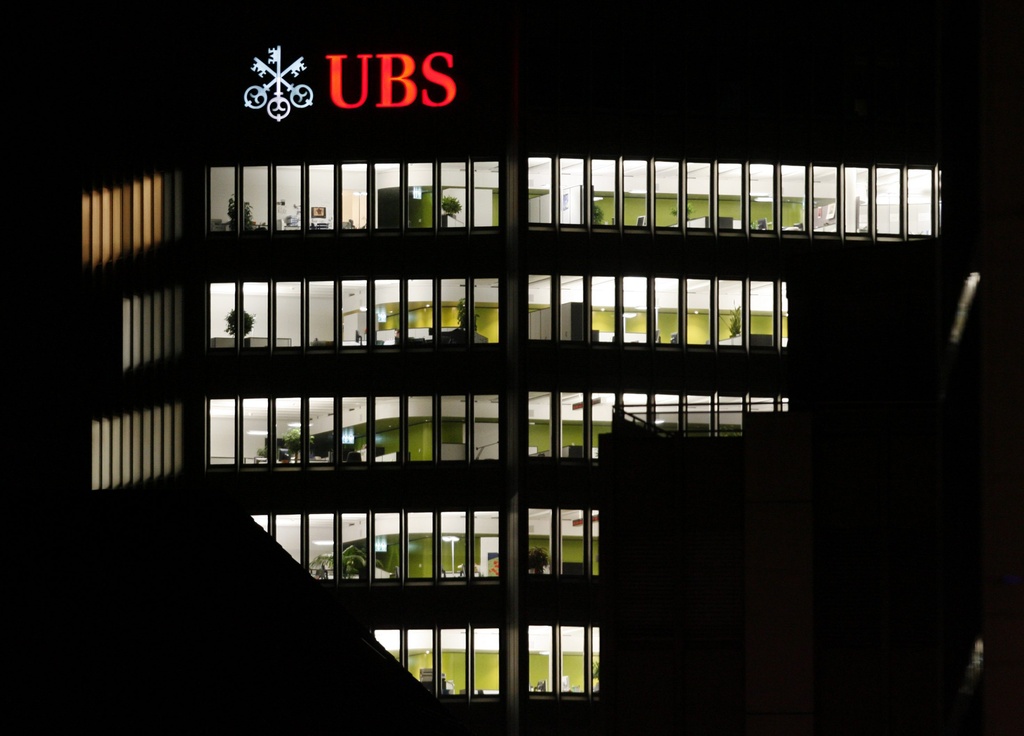Bonus politics creates tension in UBS ranks

A UBS decision to pay out SFr2.9 billion ($2.7 billion) in bonuses has not only sparked criticism outside the bank, but also left some employees feeling cheated.
Many staff in Switzerland feel they have been unfairly overlooked after being told their performance was satisfactory in 2009. Some have contacted swissinfo.ch to voice their disquiet.
UBS increased bonus payments from SFr1.7 billion in 2008 despite making a loss in 2009. Group chief executive Oswald Grübel has stated he will receive no 2009 bonus and the Swiss media reports that chairman Kaspar Villiger may also follow suit.
Not many people outside the bank would be shedding tears at reports that UBS has clawed bank some SFr300 million in 2009 cash bonuses to senior staff because of missed targets.
But many Swiss employees in lower-salaried positions are questioning why they have been passed over for bonuses despite meeting individual performance targets. The total bonus pool will be distributed among fewer staff this year as the bank reduced its headcount by 12,550 in 2009 to around 65,000 staff.
“This year, people with satisfactory appraisals have been told that the measurements [that determine bonus payments] have been raised. People have missed out on their bonuses without justification and that makes them angry,” one IT employee told swissinfo.ch on condition of anonymity.
“Beyond fury”
Another employee telephoned swissinfo.ch to say he was “beyond fury” at what he termed the “rape” of the new bonus system.
“We made a loss last year, so I would have been content if no-one had received a bonus,” he said. “But since the bonus pool has been increased it would have been fair to throw a few breadcrumbs to employees who have worked over-time and weekends just to say thank you.”
Far from expecting multi-million franc bonuses, these employees would typically receive an extra month’s salary if they performed well.
Discontentment is widespread among UBS staff in Switzerland, according to Elli Planta, president of the bank’s Employee Representation Committee (ERC).
“In the past, staff were told that if their appraisals were satisfactory they would be entitled to a bonus,” she told swissinfo.ch. “There are people who performed well under difficult conditions last year who do not understand the world any more.”
Part of the problem is a miscommunication from management of new parameters to determine who receives a bonus, Planta added. The new system of grading employees for bonuses appears to be causing confusion and frustration.
“The distribution of bonuses is not understood and is not transparent enough,” she said. “People can take quite a lot if they just understand what is going on.”
Secrecy attacked
Unions have also complained that bonuses are arbitrary and are frustrated that, unlike with base salaries, they have no powers of consultation or negotiation over the size or distribution of performance-related pay.
“This demonstrates that bonuses are arranged for the banks’ own interests and not the interests of employees. Inevitably, some people get a lot of money and some people get nothing,” Denise Chervet, General Secretary of the Swiss Bank Employees Association, told swissinfo.ch.
The Swiss Financial Market Supervisory Authority (Finma), that regulates the industry, had forced UBS to slash bonuses by some 80 per cent in 2008. But the body has had no legal authority to directly intervene in the bank’s bonus policy since UBS paid back emergency government funds last summer.
That has not stopped the Swiss media speculating that Finma pressured the bank into shaving SFr1 billion off its 2009 bonus pool, but UBS CEO Grübel denied this in February.
Atlantic rift
The bank has made changes to its performance related pay, setting long-term goals, deferring large chunks of bonuses and clawing back part or all of individual bonuses if targets are not met.
Contacted by swissinfo.ch, UBS would not disclose how bonuses are distributed or say what criteria were applied. But the bank has made no secret of its desire to stem the outflow of star performers to rivals, particularly in its wealth management division.
In this respect the bank has not been helped by competitors, particularly in the United States, substantially raising bonuses in 2009. This has heightened suspicions among Swiss staff that much of the bonus pool is being transferred across the Atlantic.
According to Planta, this is leading to the widening of a gulf between cultures within the bank that was started by UBS’s expansion in the US in recent years.
“The Swiss financial market is money driven but we do not share the Anglo-Saxon ‘fast money’ philosophy,” she said. “We are coming to a point when people are going to say that they have had enough.”
Matthew Allen in Zurich, swissinfo.ch
Following the financial crash of 2008 and the subsequent bailout of many global banks using taxpayers’ money, the issue of bonuses has been a hot potato in many countries.
In Switzerland, UBS was the only bank to receive financial aid from the state and this was paid back last year.
The Swiss financial regulator, Finma, has issued new rules on variable compensation that will come into force as of next year. These rules demand a link between compensation and long-term targets and more transparency.
UBS and Credit Suisse have both voluntarily introduced new compensation systems that defer part of bonus payments for three years, which is only paid out if targets are met.
UBS increased 2009 bonuses from SFr1.7 billion in 2008 to SFr2.9 billion last year. Some 60% of this will be deferred for high earning employees. The bank is expected to announce losses of around SFr2.7 billion compared with a SFr21 billion loss in 2008.
Credit Suisse will defer 40% of its SFr6.85 billion bonus pool for 2009. The bank reported a SFr6.7 billion profit last year compared to a SFr8.22 billion loss for 2008.
Bonuses on Wall Street rose 17% to more than $20 billion (SFr21.5 billion) in 2009, according to the New York State comptroller.
In Britain, troubled Royal Bank of Scotland set aside £1.3 billion (SFr2.1 billion) for bonuses despite making a £3.6 billion loss.
Both Britain and France last year introduced windfall bank bonus taxes to reclaim part of the bailout money to the public coffers.
Many executives have bowed to public and political pressure to forego 2009 bonuses or to increase the proportion of shares they received in relation to cash.

In compliance with the JTI standards
More: SWI swissinfo.ch certified by the Journalism Trust Initiative













You can find an overview of ongoing debates with our journalists here . Please join us!
If you want to start a conversation about a topic raised in this article or want to report factual errors, email us at english@swissinfo.ch.